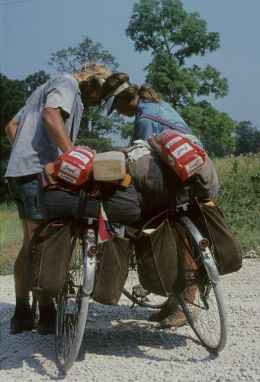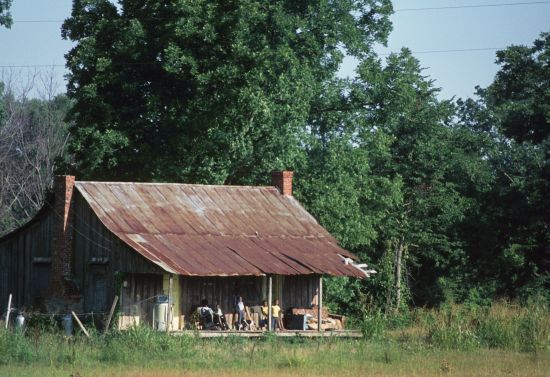| Barelds - Cycling around the world - Cycle stories - Asia, Africa, Europe, America | ||||||||||||||||||||
| home | site map | world | children | recent | cooking | dutch | german | react | ||||||||||||
Central and North America (6).

United States: in order to live cheaply, we bought "balloon loaf" but we needed piles of this air-loaf.
In the hotel room, in streams of sweat Henny sat on the floor, replacing spokes and repairing other things. We threw water on the bed before we went to sleep and at night we woke up to take a cold shower and in the morning we were glad to get on our bikes again because we could feel the air flowing over us, which brought at least some coolness.
W
e had been queuing up for 5 hours and after that we sat for 1½ hour, for that visa of he US, but then we could easily enter the country. Texas was equally hot, dry and without trees, just as in North-Mexico, but there were no further similarities. The traffic was a great improvement, no hooting, no stench, no noise, busier that's true, but it whizzed softly on the multi-lane roads, without overtaking one another.Paraffin oil, formerly you could buy any quantity, now only in one-gallon package. Milk also was only available in one gallon (4 liter) cartons, but in the heat that was no problem for thirsty cyclists.
The thing we had to get used to was the fact that you saw hardly any people outdoors, cities and villages seemed deserted, at the supermarkets you saw flashes of people hastily getting out of airco cars into airco shops. "How hot it is" they said to Henny who was waiting outside, obvious when you live in air conditioning. I had a bad cold because I had to do the shopping, going inside was as if went into a fridge and when you came out as if you went into an oven. The gathering of fresh food mostly was small. "Everything is canned here", I said to Henny. "Even the people" he said.

United States: Uncle Tom's cabin still exists.
En passant we managed to buy some good maps and so we began cycling on country roads. Often forest roads, and quiet roads. They only were not signposted, so at a junction we sometimes had to ask the way. You didn't have to count on a walker or a cyclist, so we tried stop a car. To our surprise almost nobody stopped; fear, suspicion? "What are you doing on this small road", we were asked unkindly and often suspiciously, the fact that you were cycling for pleasure, nobody could imagine that!
Camping sites were not at cycling distance of course, moreover above our budget, which we needed entirely for our food. Free camping was not forbidden, but practically impossible since everything was fenced: "Stay away, access prohibited" signs everywhere. That is to say, at the farmers. This meant, every evening a number of refusals and one admission.
"My mother is allergic to foreigners"
"No" said an old woman, " I am on my own"
"After 20 miles is a camping site"
"We have no drinking water"
"I am afraid of fire"
"When someone comes out with a gun, you had better buzz off"
"I would advise you not to put up the tent there"
Or simply :"No, move on."
| Start World around | Central and North America | << Previous | Next page >> | |||
| Barelds on bicycle through the world - Cycling in Asia, Europe, Africa, America | ||||||